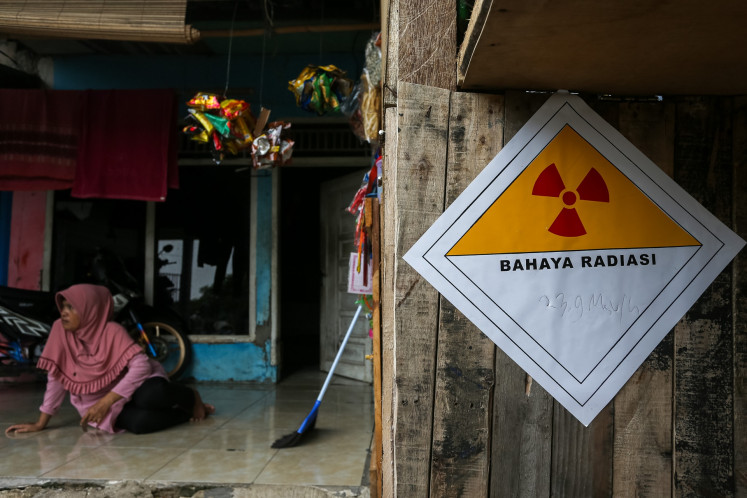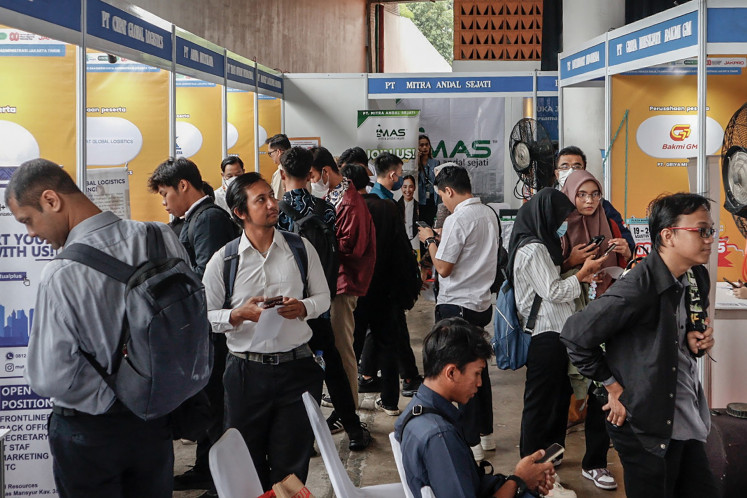Popular Reads
Top Results
Can't find what you're looking for?
View all search resultsPopular Reads
Top Results
Can't find what you're looking for?
View all search resultsProgressive tax is boon for city administration
In just over three months, the progressive tax plan for vehicle owners has yielded significant benefits, with the City Tax Office recording a significant increase in revenue from the vehicle ownership tax
Change text size
Gift Premium Articles
to Anyone
I
n just over three months, the progressive tax plan for vehicle owners has yielded significant benefits, with the City Tax Office recording a significant increase in revenue from the vehicle ownership tax.
City Tax Office head Iwan Setiawandi said Monday that the city had collected more than Rp 800 billion (US$92.8 million) in revenue from vehicle ownership tax revenue in the first three months of the year.
“It’s an increase of around 16 percent from last year’s revenue during the same period,” Iwan told reporters at City Hall.
Under the new tax program, the administration has imposed a 1.5 percent tax rate based on a vehicle’s value for the first vehicle owned by an individual and 2 to 4 percent on additional vehicles they purchase.
The progressive tax system was enacted Jan. 1 this year.
The administration collected a total of Rp 3.1 trillion in vehicle ownership taxes last year, exceeding the initial target of Rp 2.9 trillion. The target for 2011 has been set at Rp 3.5 trillion.
The Tax Office expects to collect higher taxes from 710,000 vehicle owners under the progressive tax system. There are currently more than five million vehicles registered in Jakarta.
“The progressive system is based on principles of fairness. Those who make more money will have to pay more taxes. If people own more than one vehicle, it means they earn more money,” Iwan said.
He said, however, that the progressive tax scheme was not initially aimed at reducing the number of vehicles or congestion in the city.
“The primary goal is to collect more revenue. However, 10 percent of revenue from vehicle taxes will be channeled to infrastructure projects and developing public transportation,” Iwan said.
Vehicle-related taxes have remained the city’s largest source of income. The City Tax Office aims to collect Rp 7.5 trillion from vehicle ownership transfer fees and vehicle ownership taxes this year.
The city administration expects to collect Rp 11.5 trillion in total taxes this year.
More than 1,500 new motorcycles and more than 500 new cars enter the city’s streets every day.
There are currently more than 11.3 million vehicles in Jakarta. The number is expected to grow to 12 million by the end of the year.
Trisakti University’s transportation expert Trisbiantara said that the city had its priorities wrong in treating tax money for infrastructure only as an afterthought.
“With the current tax system, the city practically robbed people of their money. They levied higher vehicle tax rates but have yet to provide a proper public transportation system,” Trisbiantara told The Jakarta Post on Monday.
He said that the administration should have provided better public transport before imposing additional taxes.
“The owners of private vehicles, although they have been paying more taxes, have no better alternative because even the TransJakarta bus rapid transit can’t handle the rush hour demand,” he said.
Trisbiantara also said the regulation that earmarked only 10 percent of vehicle tax revenue
for public transportation projects was flawed.
“They should have given more than 10 percent. In fact, the largest sum should be allocated for public transportation projects,” he said.










